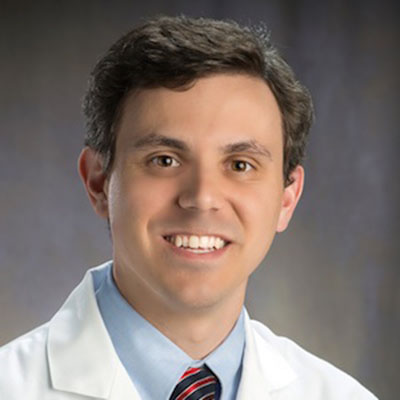Non-small cell lung cancer (NSCLC) is a difficult disease to treat and cure. The prognosis is particularly poor if it spreads to the brain, which can occur in 20 to 30 percent of patients with this disease.
Dr. Andrew Baschnagel, assistant professor of human oncology at the University of Wisconsin School of Medicine and Public Health, is working to develop preclinical NSCLC brain metastases models with the goal of improving treatment. He is the 2017 recipient of the Paul P. Carbone Young Investigator Award. This $50,000 award will fund his project to develop mouse models to study how brain metastases grow. He will then use these models to test combinations of targeted therapies and radiation therapy.
Baschnagel is collaborating with Drs. Randy Kimple, assistant professor of human oncology and John Kuo, professor of neurological surgery. Kimple’s lab will assist in establishing the cell lines and implanting them into immunodeficient mice, and Kuo’s lab will assist in the intracranial mice implants.
The goal of this project is to develop patient-derived xenografts (PDXs) to create two models: PDXs grown in the flanks and brains of mice.
“There are no good preclinical models of NSCLC brain metastases. Dr. Kuo has created intracranial models with gliomas—primary brain tumors—which is the ideal way to study them. We want to do the same with brain metastases,” Baschnagel says. “The goal is to collect tissue from 10 patients, create cell lines that grow in mice, sequence them and look for mutations that can be targeted. We want to potentially use this model to generate strong preliminary data to obtain additional funding for further experiments and hopefully move some of the findings from the laboratory into the clinic and improve patient care.”
The Carbone Cancer Center’s Young Investigator Award is supported by the Paul P. Carbone, M.D. Memorial Foundation and the UW Carbone Cancer Center. Each year, the award provides start-up funding for a junior faculty member to pursue promising cancer research and enhance his or her ability to obtain extramural support.
